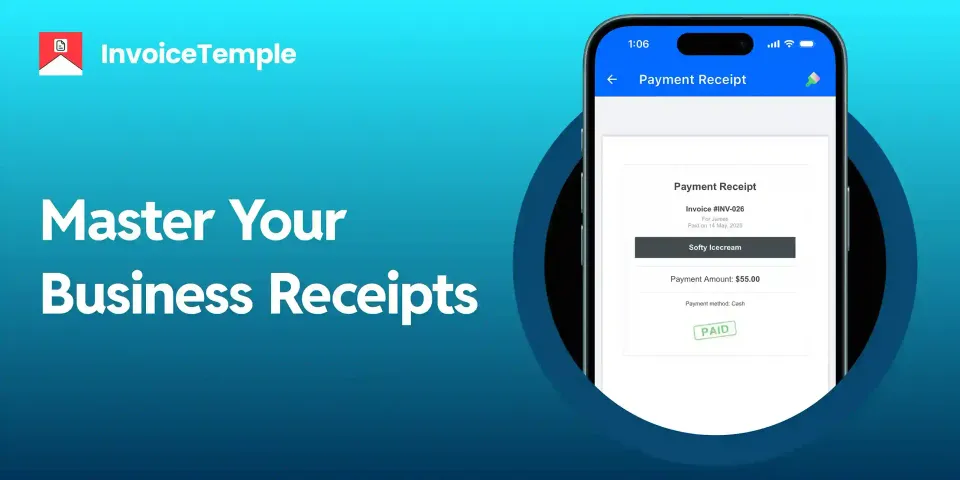Master Your Business Receipts: A Complete Guide

Are you familiar with the essential business documents? They are estimates, purchase orders, invoices, and receipts. Each document has a unique purpose at each phase of the business. Among these documents, receipts hold significant importance during the closing phase of a business transaction. Managing these receipts is crucial for running a small business. Many fail to do this process, thinking it’s difficult. But it is not as tough as you think it is. If you are a small business owner, a freelancer, or a contractor, and struggling to manage receipts, then this blog is for you. Continue reading this blog to gain valuable insights into receipt management.
What are Receipts?
Receipts are the official records that are issued by the business owners or the suppliers to the clients for making the financial transaction for the purchase made or the service offered. These receipts include the following details.
- Business details
- Details of the clients who make the payment transaction
- Invoice number
- Date on which the payment is made
- Billing reference number
- Method of payment
- Description of the items purchased or services done
- Quantity of the item
- Total amount paid
A receipt is given to a professional when all these key elements are included in it. Professional receipts can be generated using the online receipt generator.
While running a business, it is common to have expenses. And for each purchase, receipts should be gathered from the seller. These receipts safeguard our business in numerous situations and guide you in making effective decisions.
Why the Receipts Must be Kept Organized?
Organizing the receipts gives numerous benefits for the business. Some of the benefits are mentioned below.
1. Evidence for the Purchase or the Sales Done:
The receipts serve as the official proof of the purchase made by you or the sales made by you. It also helps in situations like the refunding process or the exchange process. It creates a transparent business module and assists in avoiding any business conflicts.
2. Preparation of Financial Statements:
With receipts, accurate financial statements can be generated. The financial statements are based on the receipts. This showcases the financial stability of the business and hence attracts even more investors.
3. Better Decision-Making Process:
By maintaining the receipts, you can make better business decisions. These receipts indicate your total business expenses and total business sales. With this, the incoming and outgoing amounts of the business can be calculated, and better decisions can be made.
As the benefits of organizing the receipts are effective, implementing them in business is crucial. Some of the tips for organizing these business receipts are mentioned below.
Key Tips for Organizing the Business Receipts:
1. Categorizing Receipts: As a business owner, you may have to deal with both personal and business receipts. Categorizing separately gives a clear view of business performance. Also, in business receipts, labelling them as expense receipts and sales receipts would be better.
2. Keep Proof of Everything: It is not certain that every supplier will give digital receipts. In this situation, there are chances for the manual receipts to get lost or erased. So, don’t forget to take a photocopy of the manual receipts that you received.
3. Sort the Receipts by Date: Categorizing the receipts according to the date helps in positioning the business for tax audits and periodic reports.
4. Get Guidance from Your Accountant: Consult with your business accountant and craft perfect strategies for managing the expenses, as they provide details for your business welfare.
Receipt management is a crucial process in business. So, perform it and attain better results for your business. Also, make use of an online receipt generator and customize it using the receipt templates.
